Are you an entrepreneur ready to launch your digital empire but drowning in a sea of ecommerce platform options?
As a veteran digital ecommerce store strategist who’s helped hundreds of businesses succeed online, I’m about to cut through the noise and reveal the most powerful ecommerce platforms that will make or break your online business in 2025.
Imagine having a digital storefront that not only looks stunning but also drives sales, simplifies operations, and scales effortlessly – that’s exactly what this comprehensive ecommerce platform comparison guide delivers.

What Are the Best Ecommerce Platforms for 2025?
Several leading ecommerce platforms are designed to meet diverse business needs, each with its unique strengths.
| Shopify | Best for Small to Medium-Sized Businesses |
| BigCommerce | Best for Larger Enterprises |
| WooCommerce | Best for WordPress Users |
| Wix | Best for User-Friendly Website Building |
| Squarespace | Best for Bloggers and Solopreneurs |
Assessing the features and pricing options of these platforms is essential for businesses seeking to establish a successful ecommerce platform site.
Let’s dive into the most robust ecommerce platforms that can transform your online business strategy.
1. Shopify: The Leader in Ecommerce Solutions

Shopify emerges as the gold standard for ecommerce platforms, offering an incredibly user-friendly solution for businesses of all sizes. Whether you’re a solopreneur or a growing enterprise, Shopify provides the tools to turn your online store into a revenue-generating machine.
Key Benefits
Shopify is a comprehensive ecommerce platform that offers a multitude of features to facilitate online selling.
One of its standout offerings is a user-friendly website builder equipped with customizable themes, enabling users to create visually appealing ecommerce sites without needing coding knowledge.
Shopify supports a variety of payment processing options, ensuring smooth transactions for customers.
It provides robust inventory management and shipping solutions, making it a versatile choice for businesses of all sizes. Its extensive app store allows users to enhance their online store with integrations for marketing, analytics, and customer support, while its security features, including PCI compliance, guarantee safe transactions.
Pricing
Shopify adopts a tiered pricing structure designed to accommodate diverse business needs.
The Basic plan, starting at $39 per month provides essential features ideal for automated small businesses.
The Shopify plan, priced at $105 per month, includes extra features like professional reports and gift cards for customer service rewards, making it suitable for growing ecommerce operations.
Larger enterprises can opt for the Advanced plan at $399 per month, which offers advanced reporting and third-party shipping calculations.
For high-volume merchants, Shopify Plus starts at $2,300 per month, ensuring access to premium ecommerce features.
It’s also essential to note that transaction fees may apply if businesses choose not to use Shopify Payments Gateways, influencing overall costs.
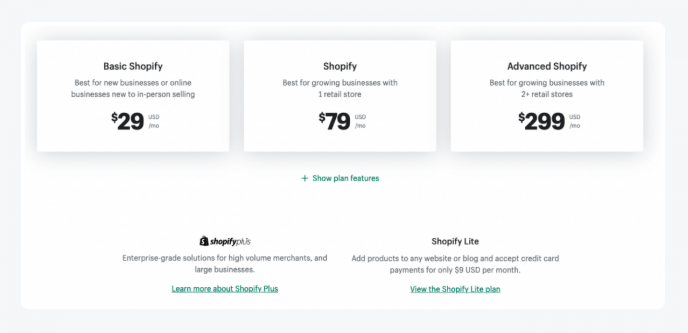
Pros & Cons
Pros:
- Extremely easy to set up and use
- Massive ecosystem of apps and integrations
- Scalable for growing businesses
Cons:
- Transaction fees can add up
- Some advanced features require additional apps
Shopify vs Other Platforms
When evaluating Shopify against other ecommerce platforms, it stands out for its ease of use and extensive app ecosystem. However, it may be more expensive than alternatives like WooCommerce, which, while free to use, can incur costs for hosting and plugins.
BigCommerce provides more built-in features without transaction fees, making it a robust competitor for businesses aiming to scale. In contrast, platforms like Wix and Squarespace focus more on website building, potentially limiting ecommerce functionalities.
Ultimately, the choice between Shopify and other platforms hinges on specific business needs, budget considerations, and growth potential.
Get started with Shopify today!
2. BigCommerce: A Powerful Ecommerce Option
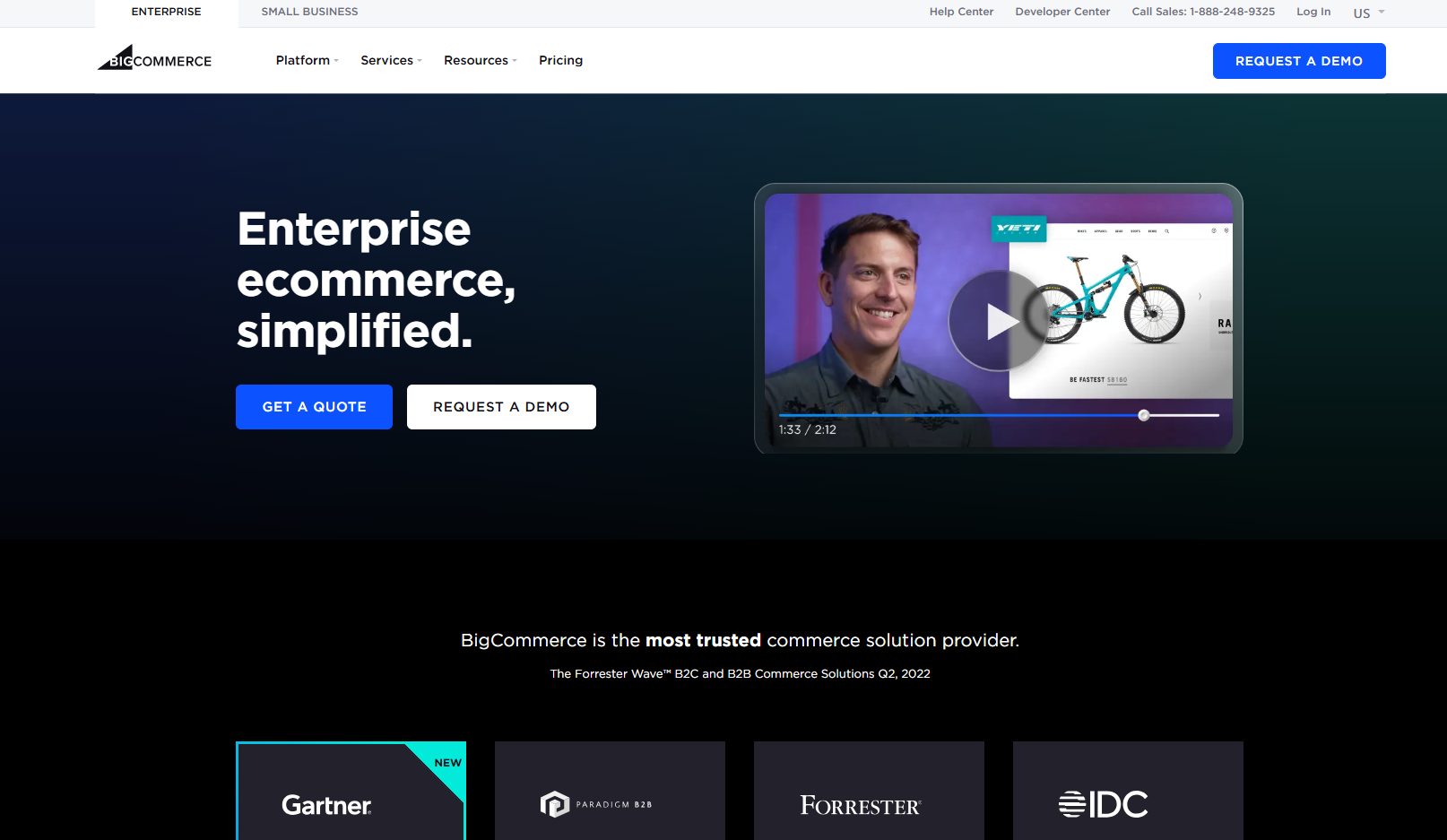
BigCommerce positions itself as a powerhouse for mid-sized to large businesses seeking comprehensive ecommerce solutions with advanced customization capabilities.
Key Benefits
BigCommerce is recognized for its robust key features tailored to high-volume sellers and businesses looking to scale.
The platform provides a comprehensive suite of tools, including advanced search engine optimization capabilities, which are crucial for enhancing online visibility.
Multi-channel selling options allow businesses to reach wider audiences, and built-in payment processing simplifies transactions.
BigCommerce supports unlimited product listings without transaction fees, enabling businesses to maximize profits.
With extensive customization options and integrations with various third-party applications, it is suitable for automated businesses looking to enhance their online presence and streamline operations.
Its scalability is a significant advantage, allowing businesses to handle increased traffic and sales efficiently.
Pricing
BigCommerce offers several pricing tiers to cater to different business requirements.
The Standard plan, starting at $39 per month, is ideal for small businesses with basic ecommerce needs.
The Plus plan, priced at $105 per month, includes extra features such as customer segmentation and abandoned cart recovery, which are essential for enhancing customer engagement.
For businesses needing more extensive functionalities, the Pro plan costs $399 per month, providing advanced reporting and product filtering options.
BigCommerce offers custom pricing for enterprise-level solutions, ensuring that larger businesses can access tailored features to meet their specific demands.
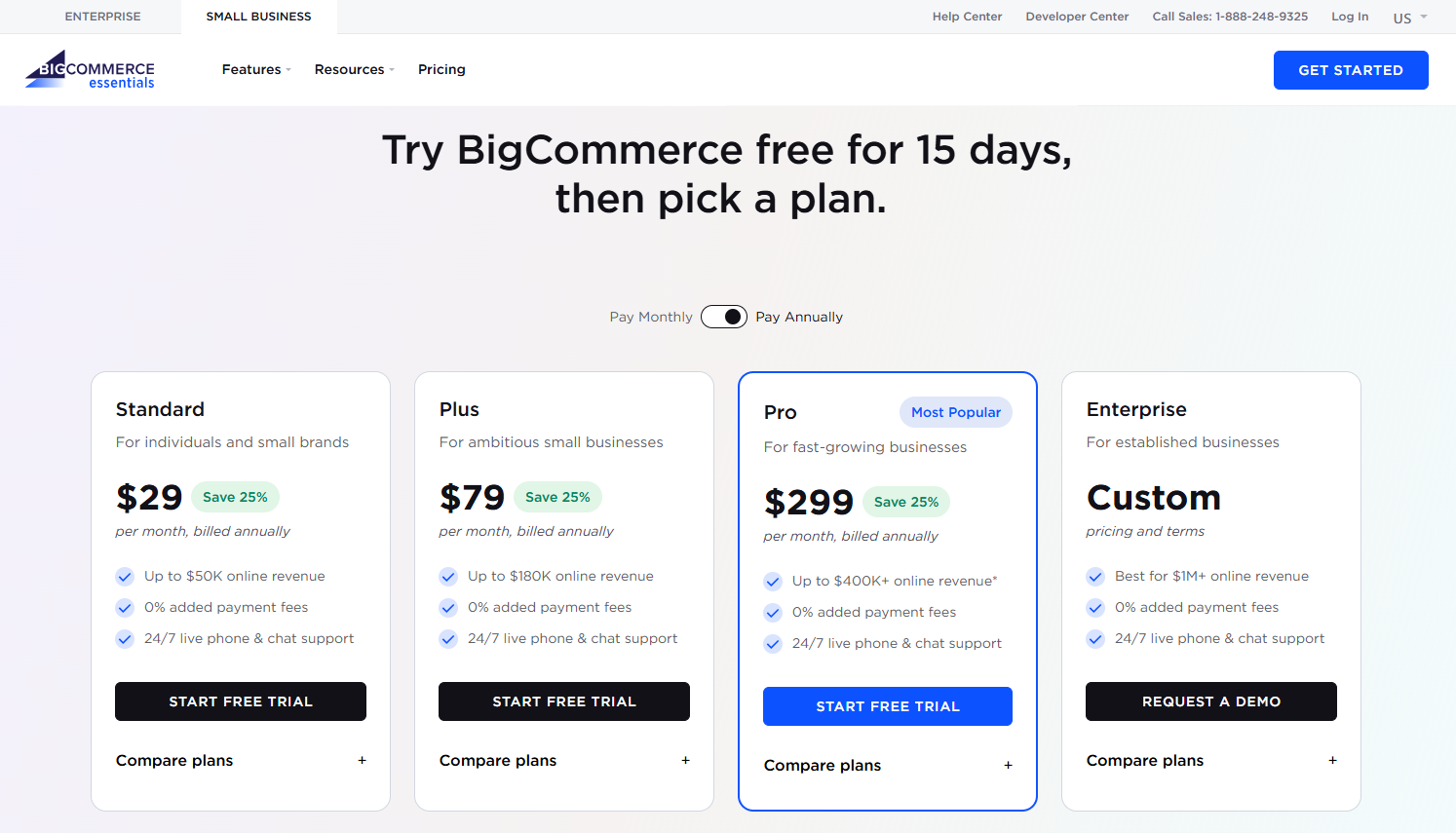
Pros & Cons
Pros:
- Robust SEO tools
- Fewer third-party app dependencies
- Excellent for international selling
Cons:
- Steeper learning curve
- Can overwhelm new users
- Limited free theme options
Get started with BigCommerce today!
3. WooCommerce: The Best Free Ecommerce Solution
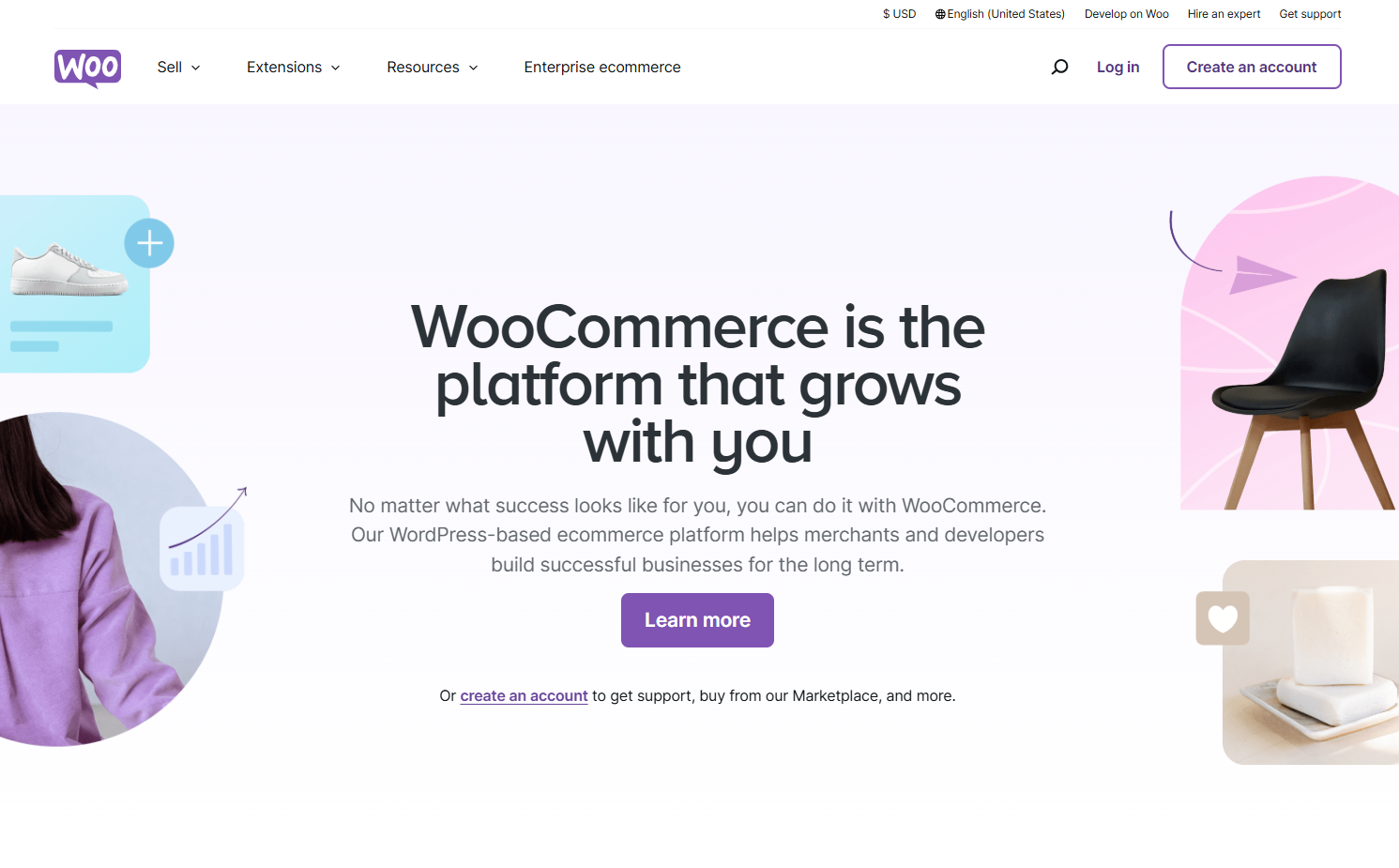
WooCommerce offers a flexible, cost-effective solution for WordPress users looking to add ecommerce functionality.
Key Benefits
WooCommerce is a highly versatile, open-source plugin for WordPress that enables users to transform their existing websites into fully functional online stores.
With extensive customization options, WooCommerce allows businesses to tailor their ecommerce site to meet specific needs, whether selling physical products or digital goods.
Key features include:
- robust product management
- inventory tracking
- seamless integration with various payment gateways, ensuring a smooth shopping experience for customers.
However, it is essential to note that setting up and maintaining WooCommerce requires some technical knowledge, which may pose challenges for non-technical users. Despite this, it remains a popular choice for those looking for a cost-effective ecommerce solution.
Pricing
While WooCommerce itself is free to use, businesses need to consider additional costs associated with running an online store. These expenses can include web hosting fees, payment processing fees, and costs for premium themes or plugins that enhance functionality.
Hosting can range significantly, from $3.95 to $5,000 per month, depending on the provider and plan selected. Additionally, ensuring proper security measures may require further investment. Despite the potential for these extra costs, WooCommerce remains an attractive option for users with existing WordPress sites who seek to build a robust ecommerce platform without a hefty initial investment.
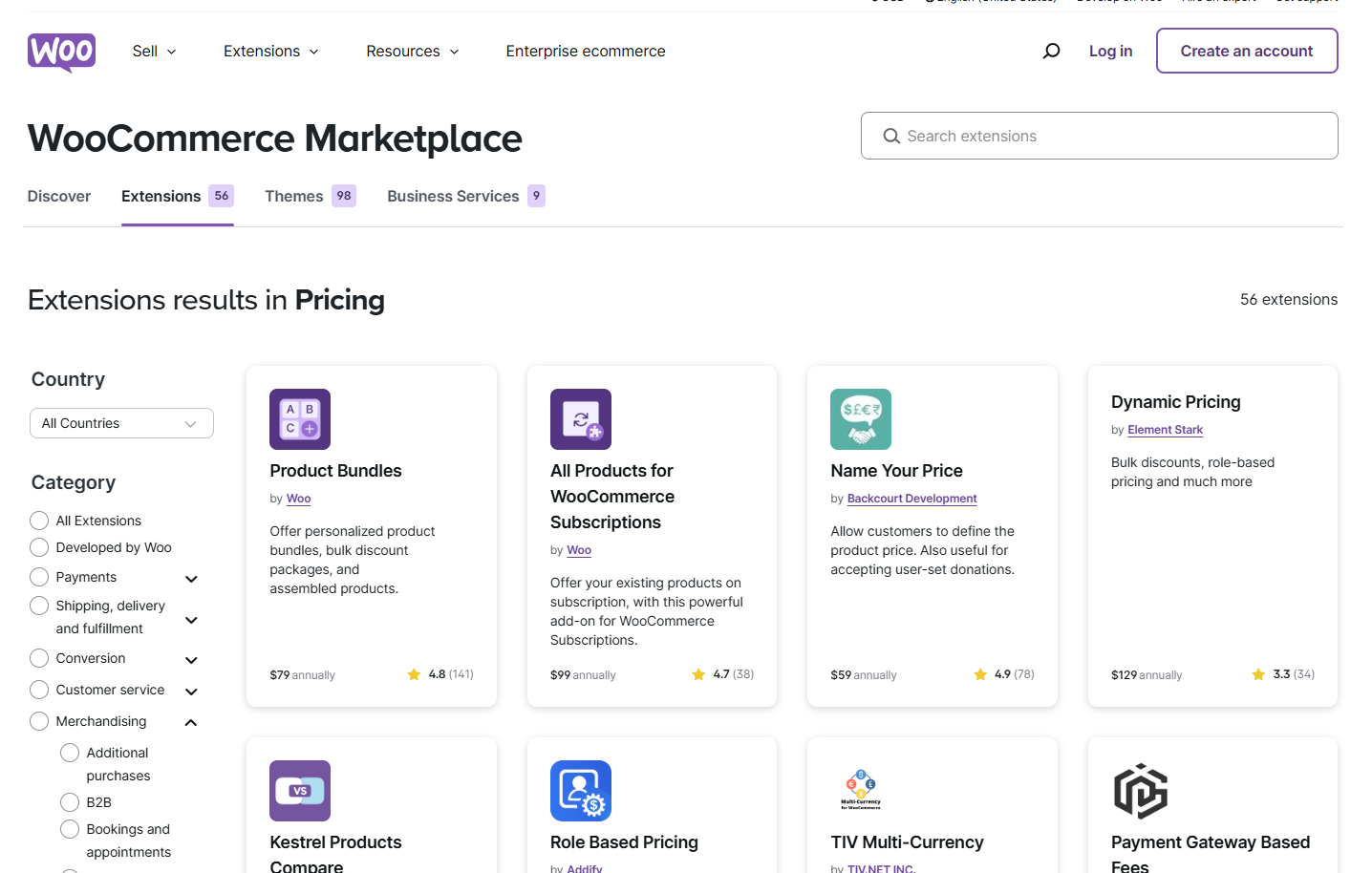
Pros & Cons
Pros:
- Most budget-friendly option
- Highly flexible
- Strong community backing
Cons:
- Requires more technical management
- Potential hidden costs
- Steeper learning curve
Get started with WooCommerce today!
4. Wix: User-Friendly Website Builder
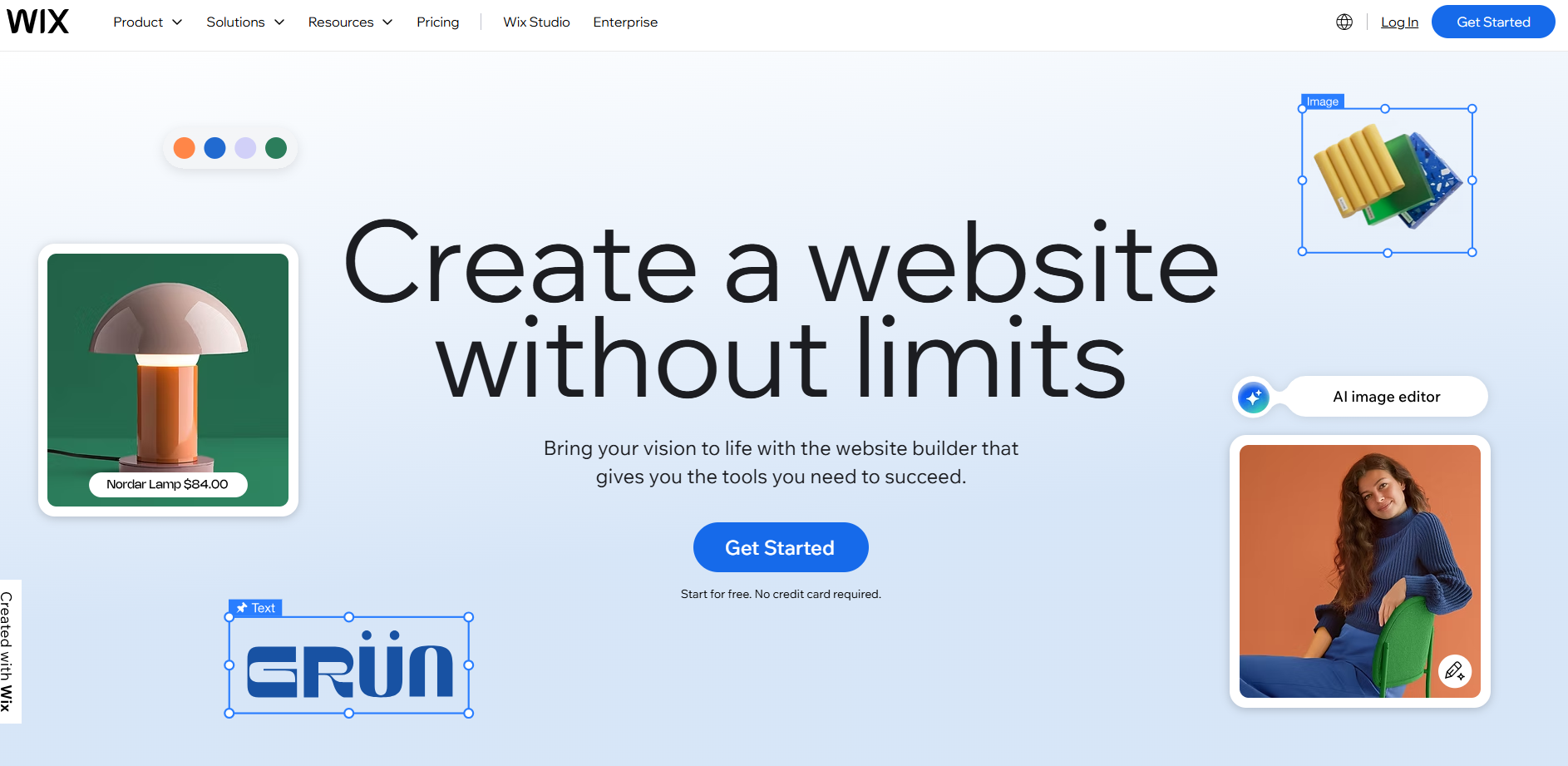
Wix website builder offers simplified ecommerce store solutions for small businesses and creatives.
Key Benefits
Wix stands out as a prominent website builder that caters to users looking to create an ecommerce store without any technical expertise.
The platform features a drag-and-drop interface that simplifies the website building process, allowing users to design visually appealing online stores effortlessly.
Wix offers essential ecommerce tools, including inventory management, payment processing, and shipping solutions, enabling users to manage their online business efficiently.
However, while Wix provides a solid foundation for small businesses or individuals seeking to establish an online presence, its ecommerce websites functionalities may not be as comprehensive as dedicated platforms like Shopify or BigCommerce.
Thus, it is best suited for those needing a quick and affordable solution for their ecommerce endeavors.
Pricing
When it comes to pricing, Wix offers various plans tailored for ecommerce, starting at $29 per month for the Business Basic plan, which includes essential features for selling online.
The Business Unlimited plan is priced at $36 per month, while the Business Elite plan, at $159 per month, provides additional features like priority support and advanced ecommerce tools.
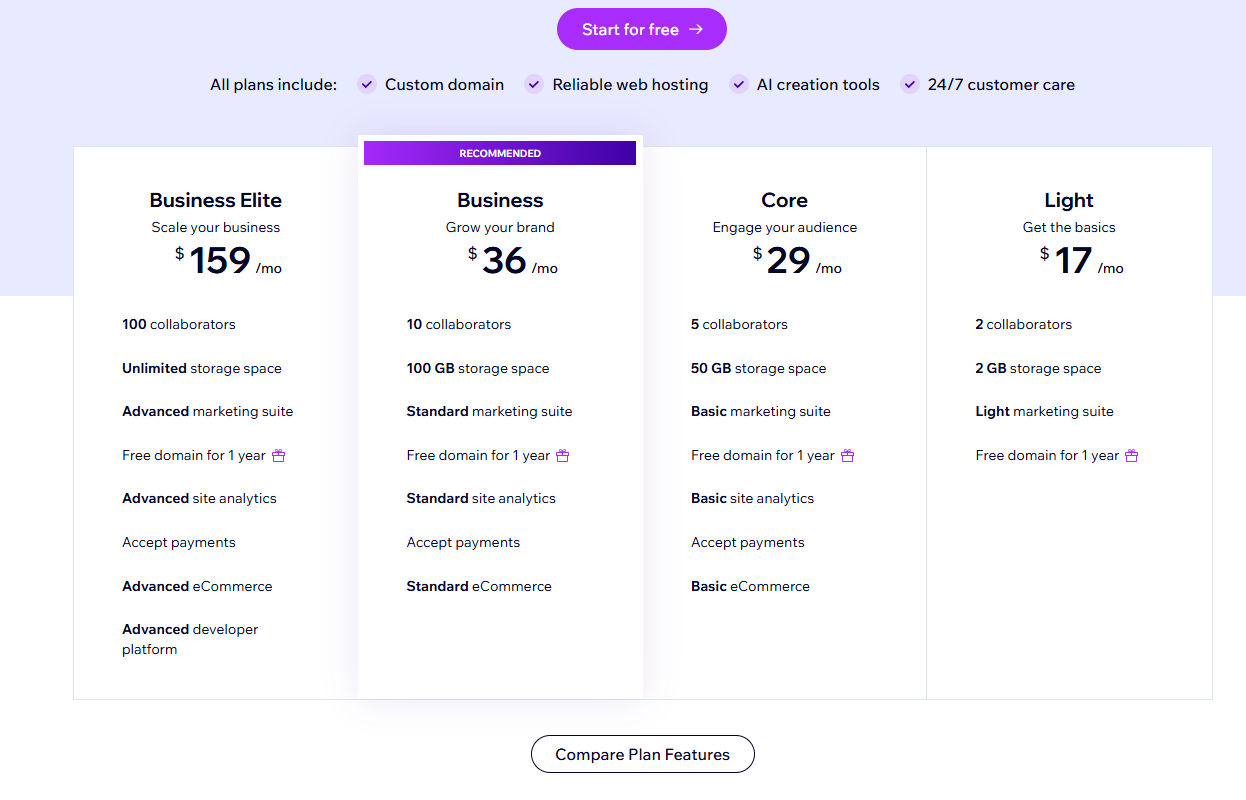
Pros & Cons
Pros:
- Simple setup
- Beautiful design options
- Integrated marketing tools
Cons:
- Limited scalability
- Less advanced ecommerce features
Check it our here!
5. Squarespace: User-Friendly Website Builder

Key Benefits
Squarespace is widely recognized for its stunning templates and user-friendly interface, making it a favored choice among creatives and service providers.
The platform offers a range of ecommerce features, such as inventory management, product variants, and built-in SEO tools that help enhance online visibility.
Squarespace allows users to sell both physical and digital products, including subscriptions, catering to diverse business needs.
However, while its focus on aesthetics and branding is commendable, Squarespace may lack the extensive ecommerce functionalities found in dedicated platforms.
Businesses in creative industries that prioritize design and visual appeal will find Squarespace to be a compelling option for their online store.
Pricing
Squarespace’s ecommerce plans start at $23 per month for the Business plan, which includes transaction fees.
The Basic Commerce plan, priced at $28 per month, eliminates transaction fees, while the Advanced Commerce plan costs $52 per month, offering more advanced ecommerce features.
Both platforms present viable options for businesses of different sizes, allowing them to choose the pricing plan that best fits their needs.
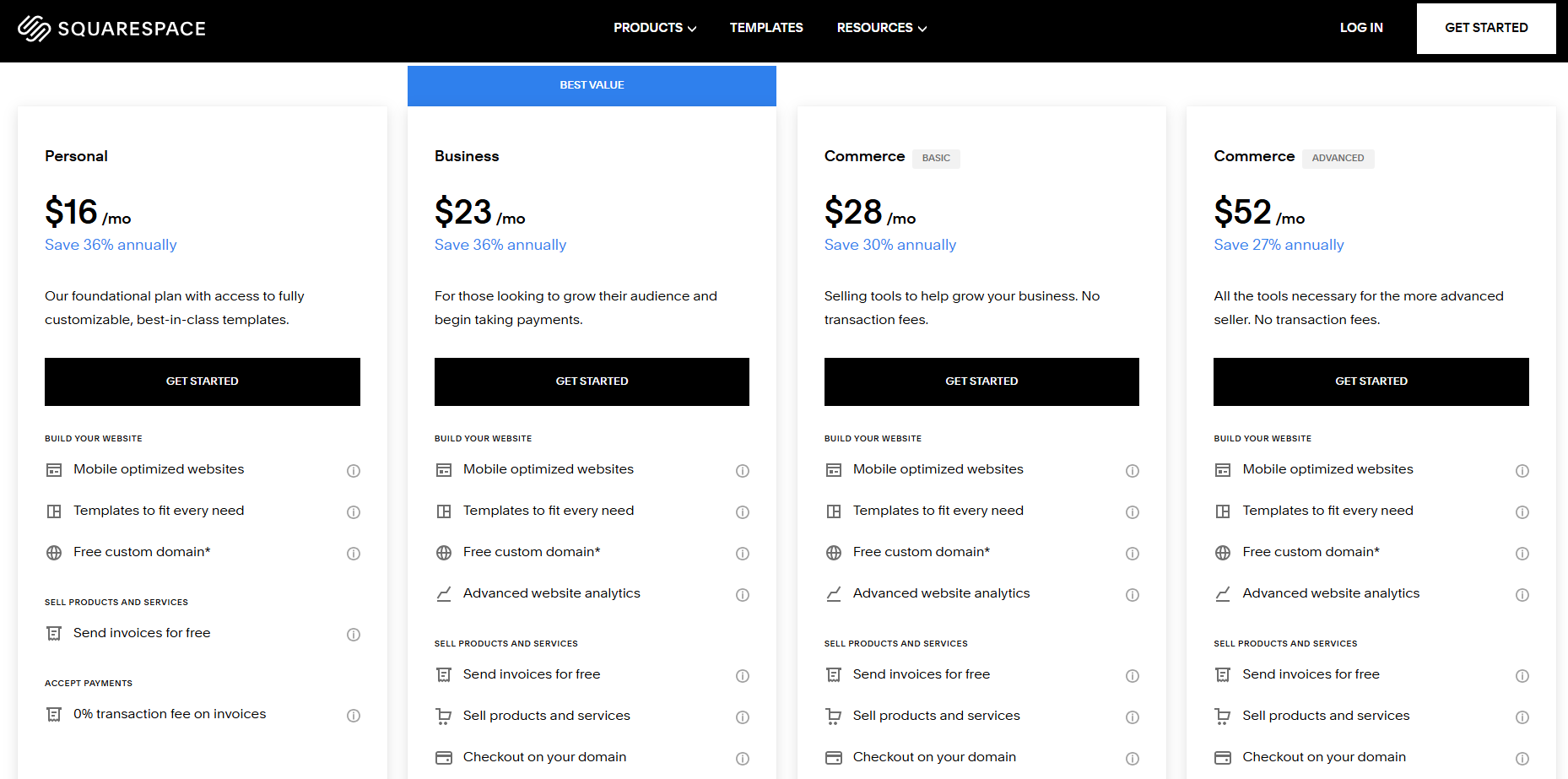
Pros & Cons
Pros:
- All-in-one platform with hosting included, reducing complexity.
- Strong SEO capabilities and built-in blogging functions enhance visibility.
- Integrated marketing tools
Cons:
- Customization options can be restrictive without coding knowledge.
- Higher transaction fees for lower-tier plans can impact profitability.
Check Squarespace!
Pricing Comparison of Ecommerce Platforms
When evaluating ecommerce platforms, understanding the pricing structures is crucial. Below is a detailed comparison of the monthly fees and additional costs associated with each platform:
| Platform | Monthly Fee | Additional Costs |
| Shopify | $29 | Themes ($140+), security licenses ($29/month) |
| BigCommerce | $29 | Themes ($150+), transaction fees (if applicable) |
| WooCommerce | Starts at $3.95 | Hosting ($10/month+), plugins (varies) |
| Wix | Starts at $17 | Apps for ecommerce features ($5-$50/app) |
| Squarespace | Starts at $16 | Premium templates ($20+), transaction fees |
Total Cost of Ownership (TCO)
Evaluating the Total Cost of Ownership (TCO) is essential for a comprehensive ecommerce pricing comparison.
Beyond basic monthly fees, consider:
- Themes: Aesthetic customization can incur significant one-time or ongoing expenses.
- Security Licenses: Compliance and protection are vital; platforms may charge separately for SSL certificates.
- Transaction Fees: Some platforms may apply fees based on sales volume or payment processors.
Understanding these elements helps businesses select a platform that aligns with their budget and growth expectations in the competitive landscape of 2025.
Essential Features to Consider in Ecommerce Platforms
Choosing the right ecommerce platform involves careful thought about key features that contribute to successful operations.
Important functionalities include:
1. Payment Gateways
Smooth payment processing is essential. Platforms should accommodate various payment methods, such as best credit cards to use, digital wallets, and buy now, pay later options.
2. Inventory Management Tools
Effective automated inventory management is crucial for tracking stock levels, managing suppliers, and streamlining order fulfillment. This feature ensures that businesses can satisfy customer demand without facing overstock or stock shortages.
3. SEO Integrations
Robust SEO capabilities are important for achieving visibility in search engine results. Platforms should offer tools for optimizing product pages, meta tags, and URLs to boost organic traffic.
Assessing these features in relation to business goals is vital. A platform that meets specific requirements can greatly influence focus on user experience and operational efficiency. For example, a store focused on high-volume sales may prioritize strong inventory management, while a brand seeking online visibility might focus on SEO integrations.

Investing in the right features not only improves functionality but also supports long-term growth strategies. Understanding how these elements work together enables businesses to build a cohesive online presence that fulfills customer expectations and drives conversions.
What Are Ecommerce Platforms?
Ecommerce platforms are comprehensive digital solutions that enable businesses to create online stores, manage products, process payments, and handle customer interactions.
They serve as the technological backbone of digital retail, providing tools for everything from website design to inventory management.
How Can Ecommerce Platforms Benefit You?
These platforms democratize online selling, allowing businesses of all sizes to compete in the digital marketplace.
They reduce technical barriers, provide powerful marketing tools, and create seamless shopping experiences that can dramatically increase conversion rates and customer satisfaction.
Buyers Guide: How We Conducted Our Research
To identify the best ecommerce platforms for 2025, we carried out a thorough analysis based on several key criteria to ensure we provide accurate and actionable insights:
Pricing Structures:
- We looked into the monthly fees for each platform, along with any extra costs for themes or plugins, and potential transaction fees to give a comprehensive view of the total cost of ownership (TCO).
Features:
- Our review involved a detailed examination of the essential features each platform offers, including payment processing, inventory management, SEO tools, and integrations with third-party applications.
Ease of Use:
- We focused on platforms that provide intuitive interfaces and user-friendly website-building tools, which are crucial for beginners and busy entrepreneurs.
Scalability:
- We assessed how well each platform can support growth, including their capacity to handle increased traffic, provide advanced reporting tools, and facilitate multi-channel selling.
Support and Ecosystem:
- We evaluated the availability of support options (like live chat, email, and community forums), refund policies, and the robustness of the platform’s ecosystem (including apps, extensions, and developer communities).
Drawbacks and Limitations:
- We investigated any missing features or limitations, such as scalability issues, restricted customization options, or steep learning curves.
Customer Reviews and Case Studies:
- Feedback from real users offered valuable insights into how each platform performs in real-world situations, covering aspects like reliability, customer satisfaction, and common challenges.
By integrating these elements, we created a comprehensive comparison to assist businesses in making informed decisions for their ecommerce success in 2025.
Dario’s Conclusion
Choosing the right ecommerce platform is a crucial decision that can significantly influence the success of your online business idea..
In this guide, we’ve examined the best ecommerce leading platforms for 2025, showcasing their strengths, pricing, and unique features to assist you in making an informed decision.
Whether you prefer Shopify’s comprehensive ecosystem, BigCommerce’s scalability, or WooCommerce’s adaptability, there’s a solution designed to meet your needs.
As an experienced ecommerce strategist who has helped numerous businesses thrive, I offer proven expertise to support you. Rely on this guide to ease your journey, and let’s work together to build your digital empire.
Frequently Asked Questions about Ecommerce Platform Comparison
What are the advantages of using WooCommerce?
WooCommerce is a free open-source plugin for WordPress that allows for great flexibility in managing an online store. However, users should be aware of potential costs associated with additional plugins and management challenges.
What features should I consider when choosing an ecommerce platform?
Essential features to consider include payment gateways, inventory management tools, and SEO integrations. It’s important to evaluate these features against your business goals as they significantly impact overall user experience.
What are the key ecommerce platforms compared in the article?
The article compares several key players in the ecommerce landscape for 2025, including Shopify, BigCommerce, WooCommerce, Wix, and Squarespace.
What is the pricing for Shopify and what features does it offer?
Shopify offers a pricing plan starting at $29/month. Key features include a user-friendly interface, customizable checkout options, and various theme selections.
How does BigCommerce differ from Shopify?
BigCommerce also has a starting price of $29/month but focuses more on enterprise-level ecommerce solutions and offers extensive customization options. It is generally considered less user-friendly than Shopify and targets larger businesses.



